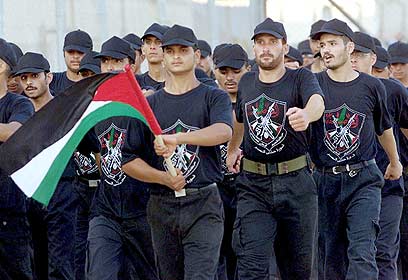
Fatah
From fledgling terror organization to the faction reigning over Palestinian politics, Ynetnews offers a brief review of the Fatah Movement
The Fatah Movement is considered the dominant force in Palestinian politics and the core force within the Palestinian Liberation Organization (PLO). The movement's name is a reverse acronym of "Harakat al-Tahrir al-Watani al-Filastini," meaning "Palestinian National Liberation Movement," in Arabic.
Fatah was formed in 1954, in Cairo. Among its founders were Yasser Arafat, Salah Khalaf, Khalil al-Wazir (also known as Abu-Jihad) and Mahmoud Abbas. The group's goal was clear: liberating the Palestinian people from Israel's conquest via an armed struggle.
Coming to power
Fatah's first major attack on an Israeli target came on January 3, 1965 – later determined the organization's official foundation date – when its operatives launched a failed attempt to sabotage Israel's National Water Carrier.
The group became a dominant force in the Palestinian political arena after 1967's Six-Day War, basing its headquarters in Jordan and joining the PLO. Having gained the latter's logistical and financial support, the group infiltrated the West Bank and began setting up terror cells in its cities. The Israeli Defense Forces raided Fatah's Jordan base in March 1968, in an operation known as the Battle of Karameh.
Alerted to the Israeli raid, the Popular Front for the Liberation of Palestine (PFLP) and the Democratic Front for the Liberation of Palestine (DFLP), both guerilla groups based in the village of Karameh, withdrew their forces from the area. Fatah leaders were advised – by pro-Fatah officers in the Jordanian Military – to vacate their base, but the PLO ordered them to stay and the Jordanian Army eventually agreed to provide assistance should heavy fighting ensue.
The battle erupted on March 21: Israel sent massive forces to raid the area, but Fatah held out and the Jordanian Military soon weighed in on the fighting as well, causing Israel to pull its forces in order to avoid a full-scale war. By the end of the battle, 150 Fatah militants, 20 Jordanian soldiers and 28 Israeli soldiers were killed.
The escalating clashes between IDF forces and Fatah operatives in the West Bank soon became reminiscent of a delimited war. The group also began allocating more resources to launching diverse terror attacks: November of 1968 saw Fatah blow up a car bomb in a Jerusalem market, killing 12 Israelis; and September of 1970 saw it highjack four passenger planes, force landing them in a Jordanian airport.

Arafat in Damascus, 1978 (Archives: AFP)
The international pressure placed on Jordan's King Hussein following the highjacking, was a catalyst to the events of Black September. Concerned that the armed Palestinian groups in the kingdom were gearing up to create a "state within a state," King Hussein decided to expel the PLO from Jordan. He declared martial law and by September 25, his armies had crushed the PLO and Fatah, with fatalities on the Palestinians side numbering in 3,500. The king and Yasser Arafat eventually agreed on a ceasefire and 2,000 Fatah operatives, Arafat included, were allowed to cross to Syria and from there to Lebanon, where they set up their new headquarters.
In Lebanon, Fatah and Arafat soon became pivotal players in the Civil War which enveloped the country in 1975. Pressured by the PFLP, the DFLP and the Palestine Liberation Front (PLF), Fatah eventually aligned itself with the Left's Lebanese National Movement, but lost its Syrian ally – President Hafez Assad, who feared loosing control over Lebanon – in the process. Assad eventually sent his forces to fight alongside Beirut's hardliner Right against the Lebanese Left, Fatah and PLO operatives. The subsequent clashes between the sides, which went on until the early 1990's, left thousands of Palestinians dead.
Nevertheless, Fatah still found time to launch cross-border raids into Israel's north. The ongoing terror attacks led to two IDF operations – 1978's Operation Litani, which resulted in the founding of the South Lebanese Army; and 1982's Operation Peace for Galilee, which later turned into the Lebanon War. The latter forced Fatah leadership to escape Lebanon and set up its headquarters in Tunisia.
Palestinian politics
The 1960s saw Fatah become the most powerful Palestinian movement. Its operatives had all but taken over the PLO's leadership and by 1969 Yasser Arafat was named the organization's chairman and the de facto leader of the Palestinian resistance. By 1970, Fatah and the PLO were synonymous and the group kept gaining power and influence in the Arab world.
In 1983, a splinter group attempted a failed putsch within the PLO: tired of what he perceived as Arafat's "dovish" politics, senior Fatah member Said Musa al-Muragha (Abu Musa), backed by Syria, attempted to have Arafat impeached. Clashes followed the political rift, but Arafat was soon in full control again.
The Fatah officially ended its armed struggle against Israel with the introduction of the Oslo Accords in 1993; but groups affiliated with it, such as the al-Aqsa Martyrs' Brigades and the Tanzim, have continued carrying out terror attacks against Israel.
Fatah's dominance over the Palestinian Authority remained unrivaled throughout the 1990s and early 2000s, but in 2005 the tides began to turn as rival, radical Islamist movement Hamas began gaining popularity, winning that year's municipal elections in most Palestinians cities.

Fatah march in Gaza, 2006 (Archives: Reuters)
January of 2006 saw both factions campaign in the Palestinian Legislative Committee elections. Hamas won a landslide victory, taking 76 seats in the parliament, while Fatah settled for 43. The following year had Fatah struggle to keep its standing in the Palestinian street, especially in the Gaza Strip. The organization struggled further as the Western community – which views Hamas as a terror group – shunned the new government. Several failed attempts to from a unity government followed over the next 18 months, destabilizing the political situation further.
The Fatah-led Palestinian Authority eventually lost its grip on Gaza in mid 2007: the political rift had translated into violent clashes between Fatah and Hamas operatives and sporadic violence turned frequent, eventually overwhelming the Strip. The rift culminated in Hamas threatening to execute any Fatah official found in Gaza. Abbas, his cabinet and other Fatah members fled to Ramallah in early June, declaring Hamas' rule in Gaza illegitimate and reestablishing the PA's parliament in the West Bank.
The rift between the two Palestinian factions is perceived as deeply disconcerting by the Arab world and several attempts, mainly brokered by Egypt, have been made to unite the Palestinian Authority under one rule. To this date, all reconciliation attempts have proven futile.










